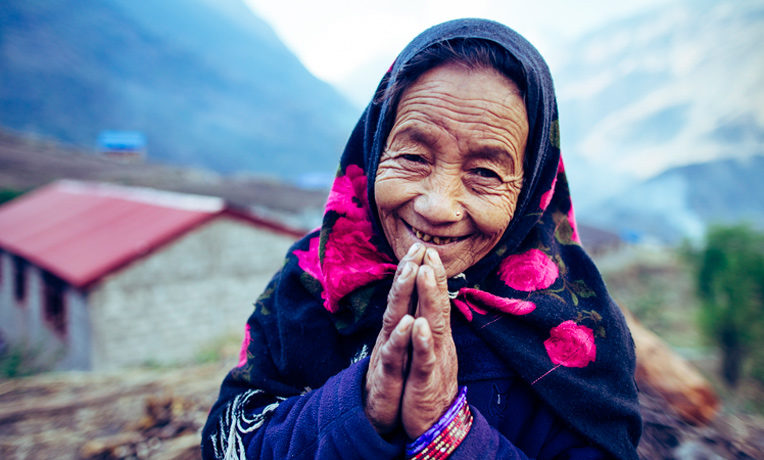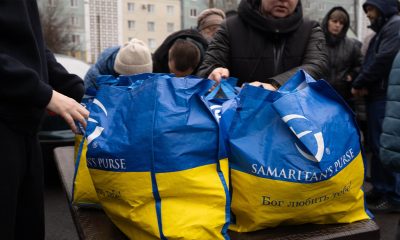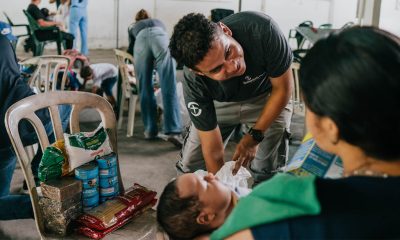Walking paths of beauty and brokenness
They say the women look like “walking trees” because the bundled leaves stack high in the baskets saddled to their backs and nearly enfold their heads into the green masses. A strap wrapped around their foreheads holds the imposing basket in place so they can haul the load home to feed their livestock.
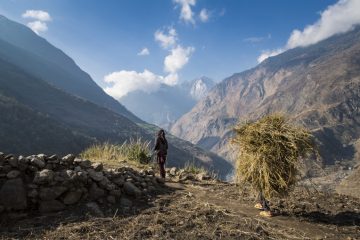
Nepal is home to many remote mountain villages.
Women and children often walk along the roadside in Nepal. Some used their baskets to carry firewood, others large water jugs.
The road seemed so lonesome and desolate that it was startling to whip around a corner and see women and children walking in the bend.
The ease with which these women balanced their heavy loads and their steady, even stride suggested this was a familiar road—one they’d walked before and one whose twists and turns had simply become part of them.
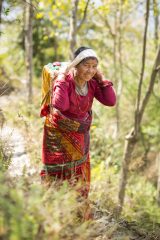
Nepali women work hard to care for their families.
They journeyed on with no visible sign of struggle, as if walking several hours every day to get water were the most natural thing in the world.
Once, when our team had stopped a few minutes to soak in the stunning mountain terrain, a group of women walked past us with their baskets. One of our staff whispered to me that among the group were most likely child brides.
The girls didn’t look more than 10 years old—too young to be so intimately familiar with this mountainside road chocked full of rocks and potholes, barely wide enough to play host to vehicles, relentless in attitude with switchback after switchback and each seemingly sharper than the one before.
These child brides will endure many hours on these roads.
A Road of Resilience
Women in a remote village of Gorkha District are also well-acquainted with hard work and perseverance. Their district was one of the hardest-hit during the April 2015 earthquake, and thousands of homes and a number of schools were destroyed.
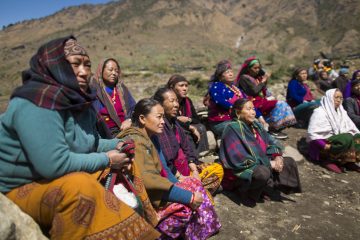
The Gorkha women’s group wants to change the future of their village.
Most women in this particular village come from farming families who diligently toil day after day but are still poor. The only way into the village, which is a two-day walk to the nearest road, is by helicopter or trekking.
Location doesn’t matter when it comes to heart issues. These women are much the same as anywhere else in the world—they care about their families, children, and neighbors. They’re fighting for their grandchildren’s future.
Samaritan’s Purse has built a house to serve as the gathering place for the women’s group meetings. This group meets regularly to talk about challenges in the village and how they can lead the charge for change.
These women are beautiful, resilient, and brave.
A Road of Kindness
Her face is a canvas of deep wrinkles earned through days of struggle and triumph. She smiled as she gently added one more knot in my tangled weave of scarves to keep them from flailing in the wind.
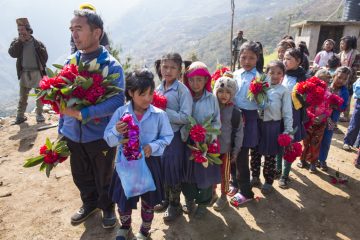
Children and teachers ready to welcome their guests
I had noticed the older woman meandering on the periphery when our team arrived at the school site. She didn’t say anything as she watched the unusual surge of activity.
Samaritan’s Purse is building a school in her village because the earthquake destroyed the former school building. In the meantime, students learn in makeshift shelters that are unsafe and cramped. While we were there, one teacher and her students had class sitting in the dirt.
The students and teachers greeted us in customary Nepali fashion by draping scarves and garlands of beautifully colored flowers around our necks. They presented us with bouquets of red rhododendron, Nepal’s national flower. Many times my arms were so full of flowers I couldn’t hold them all.
We were greeted with kindness everywhere we went for no other reason than we were guests in their communities. We’d done nothing at all to deserve their overwhelming display of warmth, trust, and honesty.
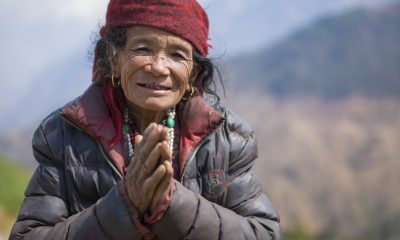
A woman who showed Samaritan’s Purse staff members much kindness
One of the most gracious, humbling welcomes we received came in a village hard-hit by the earthquake and home to people from the lowest Hindu caste. The women I met in this village are deemed the “untouchables” and shunned by society.
But to these women who allowed us into their homes and into their lives—you are loved.
And to the Gorkha women’s group fighting for your families and village: Your strength gives me strength.
To the woman who kindly helped with my scarves, I thank you for caring about a stranger.
To the women who hoist the water every day on your backs: You’re not forgotten, and you’re not alone. I pray you will know that every speck of dust from that dirt road that gets in your eyes is seen and that the calluses on your feet from the long walk home don’t go unnoticed.
I pray women in Nepal know that God knows and He loves them. I pray they know that He is strength, peace, and joy.
I pray they know I’m thankful they walked the road with me.

